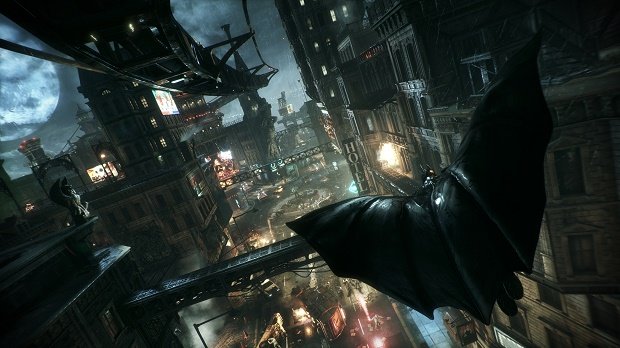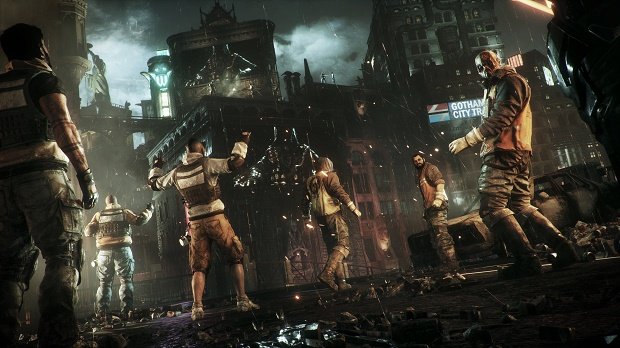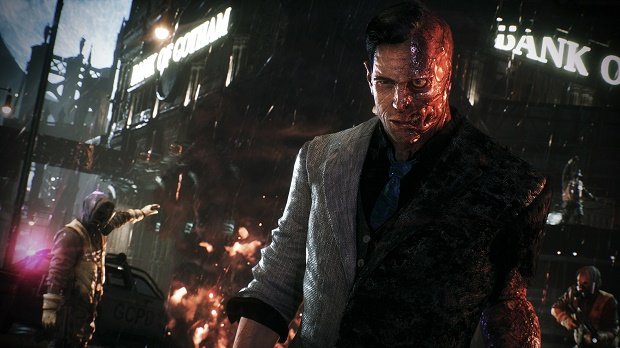What if Batman: Arkham Knight was all in your head?
Warning: Massive spoilers for basically everything about Arkham Knight follow. Seriously.
Arkham Knight is a good Batman game, but its story is by far the weakest of the Arkham series. It telegraphs its biggest surprises from a mile away, either relying too heavily on Bat-tropes like Scarecrow's toxin or Batman's relationship with the Joker, or foreshadowing those surprises with all of the nuance of the Batmobile's mounted tank cannon. The game beats you over the head with the backstory of Jason Todd, Batman's previous ward who was kidnapped, tortured, and ultimately killed by The Joker, which in turn completely ruins the revelation of the Arkham Knight's true identity.
But what if the big twist wasn't the Arkham Knight's identity, the appearance of the Joker, or the outcome of the Knightfall Protocol? What if there was a twist hiding at the end of the Arkham Knight that would change everything you thought you knew about what you've played?
What if the events of Arkham Knight took place entirely inside Batman's head?

Ah, yes, the ol' "it was all a dream" chestnut. It's one of the worst narrative cliches in the world, up there with amnesia or making you "the chosen one". But setting the events of Arkham Knight firmly inside Batman's head would make a mediocre story so much better. Not only would this set-up handily explain the exponential escalation of its narrative and hand-wave away some of its lazy reliances on Batman tropes, it would change the story's very focus. Arkham Knight would no longer be about Batman's redemption of Gotham - it would be about Batman's redemption of himself.
In a flashback early on in Arkham Knight, Commissioner Jim Gordon goes to one of the Dark Knight's many hideouts, where Gordon finds out that the Joker's toxin from Arkham City has infected five people throughout Gotham and is actually turning them into Joker. In order to find a cure, Batman and Robin are effectively holding these people hostage, experimenting on them against their will. There's a moment where Jim Gordon says he only sees four people in cells - where is the fifth? The camera lingers on the empty cell, and we see Batman's reflection in the window as he declares: "He'll be here soon."
If it's not clear, Batman is the fifth person he's talking about.
Weekly digests, tales from the communities you love, and more
After a brush with Scarecrow's gas at Ace Chemicals, the first twist is revealed: Batman is now seeing The Joker everywhere. The Dark Knight and the Clown Prince have always had a symbiotic relationship, and because Joker died in Arkham City, that relationship was physically severed. Thanks to the Joker's toxin coursing through Batman's veins, however - along with a healthy dose of the Scarecrow's own concoction - he starts hallucinating, watching his innermost fears and failures play out in front of him. He witnesses the shooting of Barbara Gordon (twice, as a matter of fact, both as a flashback and as a mind-trip brought on by another dose of Scarecrow's toxin), as well as the atrocities performed on Jason Todd. This leads to the second twist: that the seemingly unstoppable Arkham Knight is in fact Todd, attempting to get revenge on Batman for leaving him to die.

By the end of the game, Batman has been put through a wringer, stopping the Arkham Knight, then exposing his own identity to the world in order to take down Scarecrow. It's a fine Batman story, but as grand as the stakes ultimately get, we've seen all of it before. But what if the story went one step further? Instead of finishing the story off with the Knightfall Protocol, Arkham Knight would slowly pull back out of the city until you see Batman sitting alone in his cell, fighting the transformation caused by the Joker's toxin, Robin putting the finishing touches on a cure that could save him. Batman's grappling with all of the sins that he's accumulated over the years, trying to keep the madness at bay. After confronting the Scarecrow, The Joker, Jason Todd, and a rogue's gallery of other villains in his head and accepting that his presence is as much a reason why they continue to haunt Gotham, Batman can finally live with himself, even after all the pain his existence has caused.
The problem with Arkham Knight as it stands is that much of its story just feels too over-the-top, even for Batman. The opening hours are a confused, jumbled mess, throwing you into the lion's den with little explanation or fanfare, and it quickly spirals out of control. The Cloudburst toxin that Scarecrow unleashes on Gotham spreads way too fast, lingers like a waking nightmare, and it's dissolved by reviving a series of massive trees that lie dormant under Gotham City. The Arkham Knight is a relentless whirlwind, knows every move you're going to make, and always disappears right when you're about to confront him. Rocksteady's attempts to combine elements from the comic books, the animated series, and the more realistic Christopher Nolan films - a motif which served the games well in the past - now feel silly and cartoonish, thanks to Arkham Knight's constant need to one-up itself by raising the stakes far past any logical conclusion. By the time I mopped up all of the Riddler trophies and saw the true ending, I was exhausted and a little underwhelmed by Arkham Knight’s numerous attempts to be the ultimate Batman power fantasy.
But putting the events of Arkham Knight squarely inside the head of a Batman battling his inner demons means the game can be as Batman as it wants to be. It can combine every single one of Batman's villains in one game without feeling like it's doing so merely for the sake of padding out its content. This 30 hour-long adventure can take place all on one terrible, rainy night because the night becomes a metaphor for Batman's own internal battle with his dark side. It takes Jason Todd's supposed resurrection and comically overzealous pursuit as the Arkham Knight and turns him into a literal ghost of Batman's past, a constant reminder of Batman's biggest failure. It explains away how someone is able to afford an army of remote-controlled tanks and militiamen to swarm the city's streets. It even justifies the Batmobile's 11th hour upgrades and the convenient appearance of a second Batmobile that just happens to be faster and more powerful than the one that gets destroyed. Every deus ex machina, every hackneyed line of dialog, every moment where the gameplay and the story don't seem to mesh quite right can actually have a place.

Arkham Knight would no longer be about Batman and Bruce Wayne being crushed under the weighty evils of Gotham, or his long-documented relationship with the Joker, or the escalation of gameplay scenarios that are used simply to justify the sequel's existence. It would be bigger than that. It would tackle the very nature of Batman's existence. It would force Bruce to question the need for Batman and whether he actually does more harm than good. It would examine the very myth of the Batman, the sins he's committed in the name of protecting Gotham City, and the ruin he's ultimately responsible for. Arkham Knight tries to do this, but it takes itself far too literally, even at its most surreal. All of Batman's actions are in service of saving Gotham, rather than acknowledging his own involvement in its decay. Setting the events of Arkham Knight inside Batman's head would have been bold and far more surprising than its actual ending - a twist to surpass the Scarecrow bits in Arkham Asylum or the ending of Arkham City.
Alas, there's no evidence that the entire game takes place inside a Bat-mind that's slipping quickly out of control. Other than the Joker's presence and a few moments of Scarecrow-induced madness, I'm fairly convinced that the events of Arkham Knight actually happened - which is a shame to me, honestly. I find the story about a Batman grappling with his own nearly century-long history and all the baggage that brings to be far more interesting than a hyper-comic skirmish with the assortment of villains we've come to expect by now. So I'm going to believe that's what happened - and my experience with Arkham Knight will become so much better because of it.



